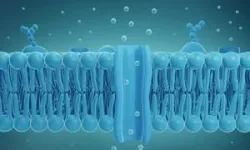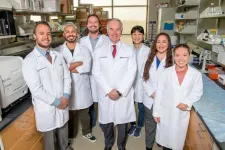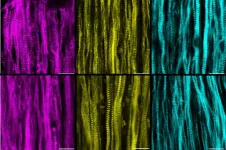Pacific Northwest Research Institute uncovers hidden DNA mechanisms of rare genetic diseases
PNRI's landmark study reveals DNA rearrangement's role in genetic disorders, paving way for new treatments
2024-06-21
(Press-News.org)
Seattle, WA — June 21, 2024 — Researchers at the Pacific Northwest Research Institute (PNRI) and collaborating institutions have made a groundbreaking discovery that could significantly advance our understanding of genomic disorders. Their latest study, funded by the National Institutes of Health[1] and published in the journal Cell Genomics, reveals how specific DNA rearrangements called inverted triplications contribute to the development of various genetic diseases.
Understanding the Study
Genomic disorders occur when there are changes or mutations in DNA that disrupt normal biological functions. These can lead to a range of health issues, including developmental delays and neurological problems. One type of complex DNA mutation involves a structure known as a duplication-triplication/inversion-duplication (DUP-TRP/INV-DUP). This study delves into how these complex rearrangements form and their impact on human health.
Key Findings
The research team, led by PNRI Assistant Investigator Cláudia Carvalho, Ph.D., collaborated with her lab colleagues, study lead author Christopher Grochowski, Ph.D., from the James R. Lupski Lab at Baylor College of Medicine, and other scientists to analyze the DNA of 24 individuals with inverted triplications.
They discovered that these rearrangements are caused by segments of DNA switching templates during the repair process. Normally, DNA repair mechanisms use the undamaged complementary strand as a template to accurately repair the damaged DNA. However, sometimes during repair, the repair machinery may inadvertently switch to a different but similar sequence elsewhere in the genome.
These switches occur within pairs of inverted repeats—sections of DNA that are mirror images of each other. Inverted repeats can confuse the repair machinery, leading to the use of the wrong template, which can disrupt normal gene function and contribute to genetic disorders.
Structural Diversity: The study found that these inverted triplications generate a surprising variety of structural variations in the genome, which can lead to different health outcomes.
Gene Dosage Impact: These rearrangements can alter the number of copies of certain genes, known as gene dosage. The correct number of gene copies is crucial for normal human development and function. Changes in gene dosage can cause diseases like MECP2 duplication syndrome, a rare neurodevelopmental disorder.
Mapping Breakpoints: By using advanced DNA sequencing techniques, the researchers identified the precise locations where these DNA segments switch templates leading to an altered number of genes including MECP2.
Dr. Carvalho and Baylor scientists first observed this pathogenic genomic structure in 2011 while studying MECP2duplication syndrome. Only recently, with the advent of long-read sequencing technology, has it become possible to investigate in detail how it forms in the genome.
Implications for Rare Disease Research and Treatment
"This study sheds light on the intricate mechanisms driving genetic rearrangements and their profound impact on rare diseases," said Dr. Cláudia Carvalho, PNRI’s lead scientist on the study. "By unraveling these complex DNA structures, we open new avenues for understanding the genetic causes of rare diseases and developing targeted treatments to improve patient outcomes."
These findings are being applied in a follow-up study led by Baylor's Davut Pehlivan, M.D., investigating how complex genomic structures influence the clinical features of MECP2 duplication syndrome and their impact on targeted therapeutic approaches.
###
About PNRI:
Pacific Northwest Research Institute (PNRI) is a nonprofit biomedical research institute, where scientists are using innovative approaches in genetics and genomics to tackle some of the most difficult problems in science and medicine. The institute was founded 67 years ago in Seattle, Washington, as a place where scientists were free to pursue discoveries that promised the highest chance of improving human health. The goal was at the beginning, and remains today, to conduct foundational science leading to impactful medical innovations. To learn more, visit pnri.org.
Media contact:
Louise Maxwell
lmaxwell@pnri.org
206-568-1479
[1] Research reported in this press release was supported in part by National Institute of General Medical Sciences of the National Institutes of Health under award number R01132589.
END
ELSE PRESS RELEASES FROM THIS DATE:
2024-06-21
(Toronto, June 20, 2024) A new review in the Journal of Medical Internet Research, published by JMIR Publications, found that community-dwelling older adults are more likely to continue using wearable monitoring devices (WMDs), like trackers, pedometers, and smartwatches, if they receive support from health care professionals or peers.
The research team from The Hong Kong Polytechnic University, led by Dr. Arkers Kwan Ching Wong, reviewed data from 3 randomized controlled trials involving over 150 older adults. The evaluation showed that the interventions that focused on increasing awareness of being monitored and used collaborative goal-setting and feedback tools, such as the SystemCHANGE ...
2024-06-21
Dr. John Kirwan, Executive Director of Pennington Biomedical Research Center, is serving as a co-principal investigator on the Pathobiology in RECOVER of Metabolic and Immune Systems, or PROMIS, study. The study has been awarded more than $802,000 by the National Institutes of Health to identify potential causes of Long COVID.
“The PROMIS study will help us better understand what is driving Long COVID,” Dr. Kirwan said. “In the early days of the pandemic, Pennington Biomedical directed its resources to address the urgent health needs of our population. Now with estimates that more than 25 percent of people in the U.S. who had COVID have experienced ...
2024-06-21
An orange teeming with antioxidants and other health benefits may be a shot in the arm for consumers and citrus growers, if the fruit is stored at cool temperatures, a new University of Florida study shows.
But it’s too soon to know if the so-called “blood oranges” are a viable crop for the Florida citrus industry, says Ali Sarkhosh, a UF/IFAS associate professor of horticultural sciences. Sarkhosh’s post-doctoral associate Fariborz Habibi explains further.
“Although blood oranges typically command higher prices than other common varieties, such as navel or ...
2024-06-21
According to a National Poll on Healthy Aging, 93% of people in the U.S. between 50-80 years old report experiencing at least one form of ageism from other people. Internalized ageism is when a person believes ageist ideas about themselves, such as thinking they had a “senior moment” or thinking they are too old to learn new technology. Internalizing ageist stereotypes can impact older people’s mental and physical health, including sexual health. Various aspects of older adults’ sexual ...
2024-06-21
DURHAM, N.C. – Biomedical engineers at Duke University have developed a new technique to better understand and test treatments for a group of extremely rare muscle disorders called dysferlinopathy or limb girdle muscular dystrophies 2B (LGMD2B). The approach grows complex, functional 3D muscle tissue from stem cells in the laboratory, creating a platform that replicates patient symptoms and treatment responses.
In its debut study, researchers reveal some of the biological mechanisms underlying the characteristic loss of mobility caused by LGMD2B. They also demonstrate that a combination of existing treatments may be able to alleviate some ...
2024-06-21
“[...] PHA is a rare yet aggressive mesenchymal tumor of the liver, which requires a multi-disciplinary approach to achieve the best patient outcomes.”
BUFFALO, NY- June 21, 2024 – A new editorial paper was published in Oncoscience (Volume 11) on May 20, 2024, entitled, “Primary hepatic angiosarcoma: Treatment options for a rare tumor.”
In this new editorial, researchers Gregory L. Guzik and Ankit Mangla from University Hospitals Cleveland Medical Center, University Hospitals Seidman Cancer ...
2024-06-21
SAN ANTONIO, June 21, 2024 – Research led by in part by The University of Texas Health Science Center at San Antonio (UT Health San Antonio) finds that the most common cerebral small-vessel disease feature seen in brain magnetic resonance imaging is a primary vascular factor associated with dementia risk.
Results of the major international study emphasize the significance of that feature, known as white matter hyperintensity (WMH) burden, in preventive strategies for dementia.
“Our findings provide converging evidence that WMH is a major vascular factor ...
2024-06-21
As wildfires become more intense and the fire season grows longer across parts of the world, humans will need to adapt. In this collection of papers from Cell Press journals One Earth and Cell Reports Sustainability, an intersection of fire management researchers comment on what needs to change to ensure we can collaborate across stakeholders in a more fire-resistant future.
The papers are publishing in advance of a Cell Press 50th Anniversary sustainabiltiy forum on the topic of “Navigating the Pyrocene: Managing fire risk in a warming world.” The virtual event, free to register, takes place Thursday, July 11, 2024 at 11:00 am ET.
This ...
2024-06-21
Inland seas around the world are drying up due to increasing human water use and accelerating climate change, and their desiccation is releasing harmful dust that pollutes the surrounding areas during acute dust storms. Using the Great Salt Lake in Utah as a case study, researchers show that dust exposure was highest among Pacific Islanders and Hispanic people and lower in white people compared to all other racial/ethnic groups, and higher for individuals without a high school diploma. Restoring the lake ...
2024-06-21
About The Study: The findings of this cohort study suggest that cannabis use may be an independent risk factor for COVID-19–related complications, even after considering cigarette smoking, vaccination status, comorbidities, and other risk factors.
Corresponding Author: To contact the corresponding author, Li-Shiun Chen, M.D., M.P.H., Sc.D., email li-shiun@wustl.edu.
To access the embargoed study: Visit our For The Media website at this link https://media.jamanetwork.com/
(doi:10.1001/jamanetworkopen.2024.17977)
Editor’s ...
LAST 30 PRESS RELEASES:
[Press-News.org] Pacific Northwest Research Institute uncovers hidden DNA mechanisms of rare genetic diseases
PNRI's landmark study reveals DNA rearrangement's role in genetic disorders, paving way for new treatments







